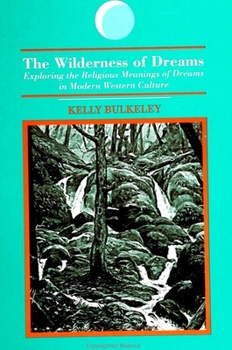The Wilderness of Dreams: Exploring the Religious Meanings of Dreams in Modern Western Culture
Select Format
Select Condition 
Book Overview
This interdisciplinary study of the religious dimensions of dreams shows how modern dream research supports and enriches our understanding of religiously meaningful dreams.
The Wilderness of Dreams does four things that no other work on dreams has done. First, it surveys the whole range of modern dream research-not just the work of depth psychologists and neuroscientists, but also the findings of anthropologists, content analysts, cognitive...
Format:Paperback
Language:English
ISBN:0791417468
ISBN13:9780791417461
Release Date:February 1994
Publisher:State University of New York Press
Length:309 Pages
Weight:1.05 lbs.
Dimensions:0.8" x 6.1" x 9.0"
Customer Reviews
3 ratings
Not bad but
Published by Thriftbooks.com User , 22 years ago
I much preferred Dreams: Gateway to the True Self.
Dreams and the search for meaning
Published by Thriftbooks.com User , 24 years ago
This is one of the best books ever written on the religious meanings of dreams. In Part One, Dr. Bulkeley traces the role of dreams in the history of religions, giving the background for the questions he will pose. He also presents the guiding metaphor of the book, the "wilderness" of dreams, indicating that while several "explorers" have come back from there with "maps", the territory is still not known -- and thus is open to interpretation. In Part Two, he summarizes some of those "explorers", twentieth century writers who have put forth theories of dreams interpretation; these include Freud and Jung, the surrealist Andre Breton, the neurobiologist J. Allen Hobson, the lucid dream advocate Stephen LaBerge, the anthropologist Barbara Tedlock, and the cognitive psychologist Harry Hunt. The variety of possible interpretations leads nicely into Part Three, where Bulkeley introduces hermeneutical theory to defend, as it were, the wilderness from the writers who would claim that it is "known". Indeed, he shows that none of the previously cited interpretations of dreams is complete and satisfying in and of itself. In Part Four, building on the work of Lakoff and Johnson, Bulkeley introduces the concept of a "root metaphor." As he explains: "Root metaphors are metaphors that express our ultimate existential concerns; root metaphors provide religious meanings that orient our lives" (p. 145). From there, he reveals his masterstroke: "dreams are our primary source of root metaphors" (p. 151). He goes back to each of the previously discussed theories of dream interpretation and re-analyzes them in terms of root metaphors, and then shows how to work with dreams using the idea of root metaphors. In Part Five, in light of the increasing secularization of the modern world, he argues that one antidote would be a more prominent place for dreams and dreamwork in our lives. I highly recommend this book to anyone interested in dreams, as well as to anyone concerned by the problem of meaning in the modern world.
Dreams and the search for meaning
Published by Thriftbooks.com User , 24 years ago
This is one of the best books ever written on the religious meanings of dreams. In Part One, Dr. Bulkeley traces the role of dreams in the history of religions, giving the background for the questions he will pose. He also presents the guiding metaphor of the book, the "wilderness" of dreams, indicating that while several "explorers" have come back from there with "maps", the territory is still not known -- and thus is open to interpretation. In Part Two, he summarizes some of those "explorers", twentieth century writers who have put forth theories of dreams interpretation; these include Freud and Jung, the surrealist Andre Breton, the neurobiologist J. Allen Hobson, the lucid dream advocate Stephen LaBerge, the anthropologist Barbara Tedlock, and the cognitive psychologist Harry Hunt. The variety of possible interpretations leads nicely into Part Three, where Bulkeley introduces hermeneutical theory to defend, as it were, the wilderness from the writers who would claim that it is "known". Indeed, he shows that none of the previously cited interpretations of dreams is complete and satisfying in and of itself. In Part Four, building on the work of Lakoff and Johnson, Bulkeley introduces the concept of a "root metaphor." As he explains: "Root metaphors are metaphors that express our ultimate existential concerns; root metaphors provide religious meanings that orient our lives" (p. 145). From there, he reveals his masterstroke: "dreams are our primary source of root metaphors" (p. 151). He goes back to each of the previously discussed theories of dream interpretation and re-analyzes them in terms of root metaphors, and then shows how to work with dreams using the idea of root metaphors. In Part Five, in light of the increasing secularization of the modern world, he argues that one antidote would be a more prominent place for dreams and dreamwork in our lives. I highly recommend this book to anyone interested in dreams, as well as to anyone concerned with the problem of meaning in the modern world.






